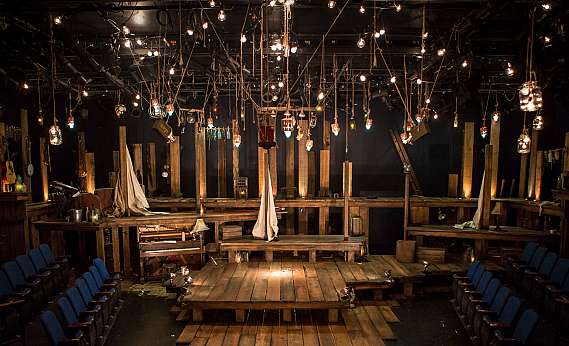The history of Quebec and the preservation of French language and culture in Canada plays a major role in A Distinct Society. Learn more about Quebec’s past efforts to retain its distinct cultural identity and their impact on present-day Canada in this article by Director of Artistic Development, Bobby Kennedy.
Half of the Haskell Free Library & Opera House—the unique setting where A Distinct Society takes place—is located in the Canadian province of Quebec, a place with a rich history of valuing its unique identity even and up to the point of pursuing independence from the rest of Canada. This complicated history plays an important part in the backstory of one of the play’s characters, Manon, the Quebecois librarian.
A vast area of almost 600,000 square miles, the land now encompassed by the province of Quebec is the traditional homeland of the Inuit and ten First Nations – the Abenakis, Algonquins, Atikamekw, Cree, Huron-Wyandot, Maliseet, Mi ‘ kmaqs, Iroquois, Innu and Naskapis. French explorers claimed the land along both banks of the Saint Lawrence River in 1535 and founded the colony of Canada, which became the largest territory within France’s North American holdings. After over 200 years of French rule, the colony was surrendered to Great Britain in 1763 as a result of France’s defeat in the Seven Years’ War. The colony was renamed the Province of Quebec, and the Francophone and Catholic population were now subjects of the British Empire. Afraid that the Canadiens might support the burgeoning American Revolution, the British passed the Quebec Act of 1774, which allowed free practice of Catholicism and the use of French civil law in the province.
As more British loyalists immigrated to the western portion of the colony, they expressed dissatisfaction with the existing arrangement of accommodating the Francophone majority. The province was partitioned for many years, but it was later re-combined after some rebellions in an effort to speed the assimilation of the French-speaking population. “Canadian” was appropriated to mean any citizen of Canada, which led the original users of that title to self-identify as “French Canadian.” In 1867, the Dominion of Canada was created by dividing the existing Province of Canada into two new provinces, Ontario and Quebec, and uniting them at a federal level with the provinces of Nova Scotia and New Brunswick.
Over the next hundred years, Quebec worked to retain its unique identity from the rest of Canada. The conservative administration of premier Maurice Duplessis (1944-1959) resisted federal government initiatives in favor of provincial autonomy and protected the Catholic Church’s prominent role in society. However, the province began to fall behind its peers in terms of socioeconomic development. When a liberal administration was elected in 1960, it kicked off what became known as the Quiet Revolution. The Quebec government secularized itself from the influence of the Catholic Church and began playing a stronger role in healthcare and education than ever before while also working to build and invest in a social safety net. Self-identification as Québécois, rather than French Canadian, grew more commonplace, and the Official Language Act was passed in 1974, making French the official language of Quebec.
However, some Quebecois wanted more than just a unique identity, and a sovereigntist political movement developed during this time as well. The Parti Québécois won power in the 1976 election and pursued a referendum on secession, which was defeated 59.56% to 40.44% in 1980. Constitutional reforms at the federal level were then pursued for a number of years, but the attempts were ultimately unsuccessful. Following the defeat of one of these reform attempts, Quebec premier Robert Bourassa gave a speech in 1990 in which he said, “English Canada must clearly understand that, no matter what is said or done, Quebec is, today and forever, a distinct society, free and able to assume control of its destiny and development.” With support for sovereignty spiking, the Parti Quebecois launched a second referendum on Quebec independence in 1995, which had the largest voter turnout in Quebec history at 93.52%. The vote was split 50.58% to 49.42% in favor of remaining a part of Canada.
While Quebec has not voted on the subject of independence again since, the concept of a “distinct society” remains present in the everyday life of people living in Canada’s second most populous province. There are many who fear the erosion of Quebec’s unique identity as the province continues to diversify and an English-speaking minority grows in Montreal. Just last year the Quebec government passed a new law further strengthening the French language’s position in society. Small and medium-sized businesses will have to certify that they operate in French (something larger companies have already had to do). Immigrants are only allowed to deal with the government in a language other than French for six months after their arrival before communication must be conducted in French. And the Quebec government has given itself new powers to verify compliance with the law. Critics claim the law promotes a monocultural Quebec in a time when Canada and the world is becoming more multicultural and inclusive. As it always has in Quebec, the debate over the correct path forward continues…


No comments yet.